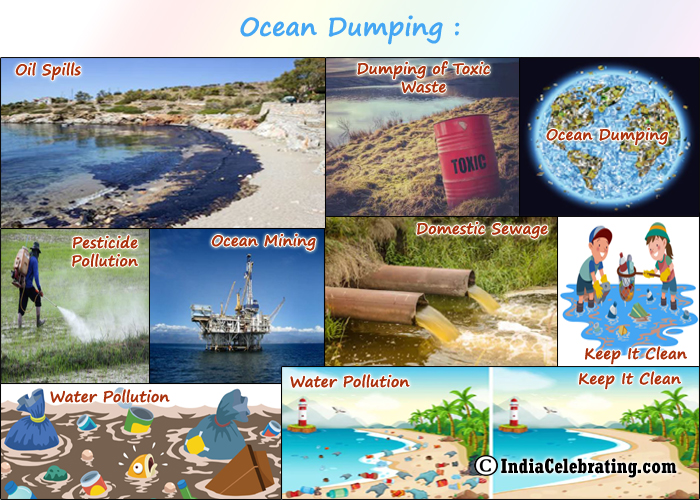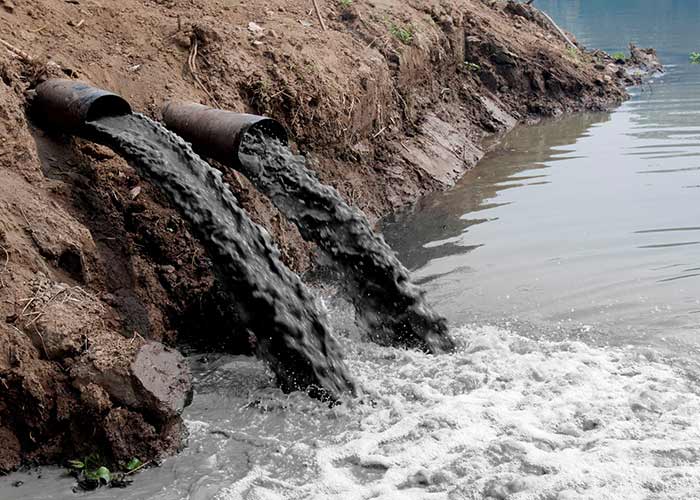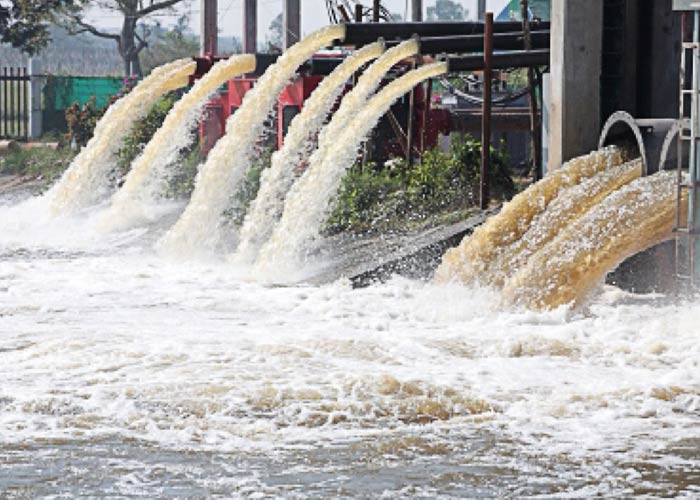Oceans are deliberated as earth’s most important, significant and valuable natural resource. They are home to most of the life on earth, which includes algae, blue whale where latter is considered as the largest mammal on the planet. Ocean is considered to be an end point as small streams flow into the river; river leads to the sea while the entire sea water accumulates into the ocean.
This indicates that humans indirectly drain huge quantities of pollutants in the oceans which are initially drained in streams, rivers and seas. Thus, we are collectively polluting the ocean which in turn is degrading their health at an alarming rate.
Meaning of Ocean Dumping
Ocean dumping refers to waste like chemicals, garbage, sewage and debris from construction factories or human habitations being dumped into the ocean which is lethal for marine biodiversity. Ocean dumping is also termed as Marine Pollution in which pollutants that are pre disposed from land like pesticides, fertilizers etc. are inevitably discarded into the ocean. Marine life is threatened not only by toxic waste but also through various sources of pollution.
Facts related to Ocean Dumping
Taking into consideration oceanic pollution, not every individual is worried and surprised but certain facts might baffle you to the core:
- Plastic is a common element which is found in enormous quantities in ocean and seas. Though it is considered harmful for the environment as it cannot be recycled and reused, but marine animals confuse plastic with their food which is even more disastrous as it is indirectly connected to humans. There are innumerable numbers of people who follow a non-vegetarian diet which even includes eating fish. In this manner the plastic that we cast off in the oceans is in turn dangerous for our health itself.
- While observing the estimates, you cannot neglect the fact that every year millions of sea birds are killed by oceanic pollution. Countless number of dolphins die each year as a consequence of becoming entangled in discarded fishing nets.
- We as human beings often assume that as maximum portion of the earth is covered with water; pollutants from the land and atmosphere will easily get diluted and will ultimately disappear in the water. This kind of consideration is a myth as in reality, they have not disappeared rather they have harmed the food chain altogether. Small animals which are present at the bottom of food chain absorb the chemicals as part of their dietary habit. The food chain functions through a vicious cycle as the small animals are then eaten by the large animals. Animals present at the upper stratification of the food chain in turn digest double amount of contaminated food which is higher in comparison to the water in which they survive.
- Oceanic world is termed as “Silent” as large number of whales, mammals, and dolphins communicate with the other aquatic animals through sound waves. You might have often wondered why fishes produce bubbles while they are moving. The ultimate reason behind this aspect is that they produce sound in order to navigate their route sand depth in the ocean water. This kind of navigation and communication is disturbed by the pollutants, which ultimately harms as well kills marine species.
Causes of Ocean Dumping
Ocean pollution has become an important matter that we all need to take into consideration due to intensified human activities that have affected the sanitation of the oceans. The primary causes of ocean pollution include:
- Dumping of Toxic Waste
The most dangerous pollutants which pollute the ocean water involve throwing garbage and other waste materials. India being a developing country consists of various factories which often cast off their waste in the ocean which is considered as the easiest choice as even they too believe that this waste will get diluted. Both sewage and garbage waste contain materials like mercury, zinc and DDT.
There are also industries creating nuclear reactors which release radioactive material in the atmosphere which ultimately finds its way into the sea water. This contaminated water tends to proliferate and relocate organisms that lead to the growth of naturally occurring fishes in a particular oceanic area.
- Excess Waste produced from Land
Farmers working in their farms without realization often tend to release the waste from their agricultural land in the nearby ponds which further assimilates into the river and at the end in the ocean water. This waste is often in the form of fertilizers and pesticides which are harmful chemicals for the marine life.
It not only creates problems for the aquatic life but these pesticides consist of a certain chemical which after coming in contact with water creates algae; often resulting in building “dead zones” in oceanic water.
- Oil Spills
Various tankers and ships in the Indian sub-continent are meant to carry oil to various other parts of the country. These ships while moving across the ocean spill tons of oil which as a consequence gets deposited in the ocean water which further pollutes the ocean. These ships often collide with each other which create a similar impact for the ocean.
Oil spill is the most harmful event especially for birds and mammals which gives them a slow and painful death. It is far more harmful than sewage and trash and is also regarded as the deepest cause of marine pollution. Oil spills are an impact of drainage from land which suffocates marine animals and those which survive experience behavioral changes and breakdown in thermal insulation i.e. it destroys the reproduction growth in aquatic animals.
- Ocean Mining
Mining under the ocean for various stones like silver, gold, copper, cobalt, etc. is another major source of ocean pollution. Mines, where ores are drilled dispose their wastes in the ocean, creating devastating impacts in the marine life on the seabed. It eventually increases toxicity in the oceanic water which often is held responsible to destroy the entire ecosystem. Ocean miming is related to long term effects rather than for a short period of time in relation to garbage and sewage dumping.
- Domestic Sewage
Sewage which mainly originates from our household is referred to as domestic sewage. It consists of wide variety of suspended impurities. We clean our houses with soaps and detergents which contain high amount of chemicals which often pollute the water leading to water pollution. Human excreta which dissolves with this chemical water leads to streams and ocean water and serves as food to bacteria present in ocean. The main consequence of this process is that algae and bacteria tend to overpopulate under water which makes it difficult for other aquatic life to survive.
Effects of Ocean Dumping
The oil dumped in the ocean by several tankers and ships clog the respiratory tract and grills of marine creatures which stops oxygen present under water to reach their organs. It also restricts their activities like producing food, reproduction process and sores down their body temperature. The causes of ocean dumping are very well similar to its effects.
When these toxic pollutants are prevalent in the oceanic water and are digested by creatures, it impacts humans too as they consume these sea creatures in their diet. This leads to detrimental diseases which include hepatitis, cancer and disruption of central nervous system.
Majority of dust particles polluting the ocean water settle in the ocean itself for very long period of time instead of getting diluted. As these pollutants and materials tend to degrade, they absorb the oxygen content present in the oceanic atmosphere which reduces oxygen levels and create problems for marine biodiversity.
You might have noticed garbage junkyards in certain areas in India, on similar pattern garbage patches are also being formed in the river water which mainly consist of plastic and garbage that cannot be reused.
Solutions of Ocean Dumping
There are several preventive measures that we as human beings can adopt to protect our oceanic biodiversity. In terms of agriculture, farmers need to be made aware about organic farming which does not require any kind of fertilizers and pesticides usage. This kind of farming is done through organic materials which helps in slow growth of fruits and vegetable and does not require any chemical to make its growth intensified.
This will ultimately benefit us as vegetables that we will consume will be organic and marine animals will also be saved through the run-off water from land. Crop rotation can be practiced by farmers which reduces the need for fertilizers.
Ships and tankers that carry oil can be supervised earlier and ensured that they are not damaged in any way and through this oil will not be spilt in the ocean water. This aspect can only be achieved through strict enforcement of regulations by Government of India.
We collectively can ensure our marine life to be secure through variety of measures:
- Consume sea food which is local instead of imported sea food as you will not know what constituents have been added to it.
- Always volunteer to keep your surroundings and beaches clean.
- Do not use soaps to clean your house, instead use lemon which is also an antioxidant for cleaning as chemicals present in detergents act as domestic sewage and in turn serves as a larger cause of ocean dumping.
Advantages and Disadvantages of Ocean Dumping
Dumping at ocean and sea creates a negative impact, yet there is a few vantage point too of ocean dumping. Disadvantages are dangerous and harmful but merits are only related to short term profit margins.
The main reason that people throw waste in ocean is linked to its convenience. Several industries fear that if they create a junkyard on land, the enforcement agency would penalize them. So, ocean is considered to be the best place to dump waste where no one can even identify them as oceans are problematic areas for regulation.
Certain items of trash actually are meant to protect the environment. Artificial reefs provide an appropriate habitat for marine animals. Car bodies, old ships are used to create these artificial reefs. Thus, products like these can only be considered advantageous for oceanic water and aquatic biodiversity.
Ocean Dumping Act
- Marine Protection, Research and Sanctuaries Act of 1972 or Ocean Dumping Act is an environmental law passed by the US Congress in 1972. The Act consists of two important elements:
- Regulation of ocean disposal of materials done intentionally.
- Authorize any kind of related step.
- In terms of India, ocean management is chiefly carried out through the enactment of legislation by both the central and state governments. In 1996 a draft was approved by the Indian Government for marine management to create certain zones as “Ocean Regulatory Zones”. The draft has still not been finalized and implemented appropriately.
- In order to cope with the multiplicity of activities in relation to the sustainable development of the Indian Ocean, the Department of Ocean Development (DOD) was created in July 1981. The DOD functions under the direct control of the Prime Minister of India. The objective of the DOD is the sustainable and environment-friendly exploration and exploitation of living and non-living marine resources for the socio-economic benefit of the country.
Conclusion
The effects of ocean pollution that we observe in recent times are on a reduced scale, but if we collectively do not end polluting our own mother earth, various other effects are bound to occur with time. Global Warming is the biggest alarm to our senses, if we do not take note of this, then our future generation will suffer. We should leave aside the traditional approach of dumping waste in the oceans; rather there is a need to take stringent measures to tackle ocean dumping.







